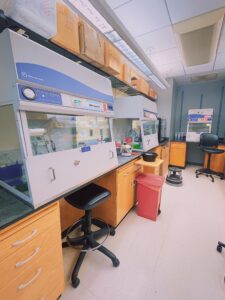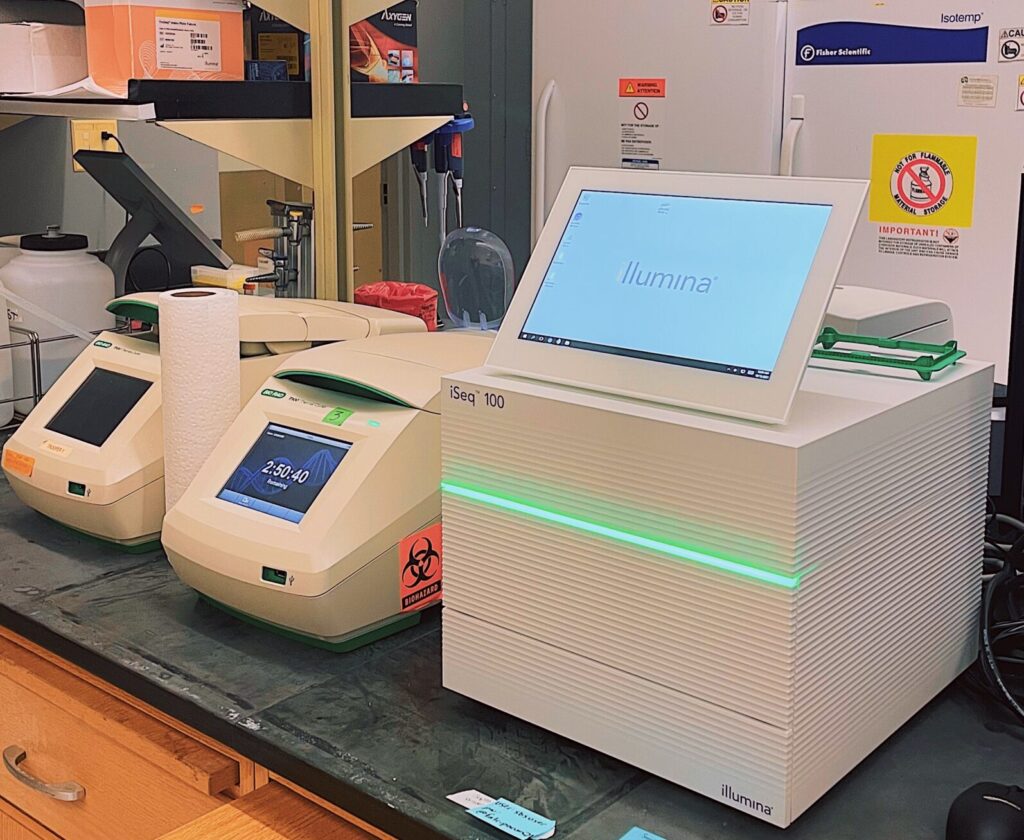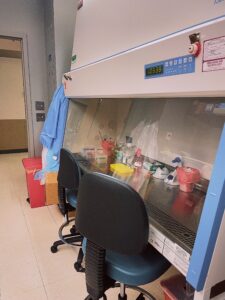FACILITIES
IDEEL occupies approximately 3,600 square feet of shared lab space on the second floor of the Medical Biomedical Research Building (MBRB) and serves as a hub for cross-cutting research and training, incorporating faculty and trainees from multiple UNC Schools and Departments.
Laboratory equipment includes an ABI QuantStudio 6 real time PCR  machine (both 96- and 384-well), three Biorad T100 PCR machines, a 96-well Applied Biosystem 2720 thermocycler, two Opentron robots, a NucliSENS miniMAG System (Biomerieux), a Biorad CFX384 real-time PCR machine, an ABI PRISM 7300 real-time PCR machine, three Eppendorf Mastercycler 96 well PCR machines, a 385-well Eppendorf Mastercycler PCR machine, an Agilent Tapestation, a Luminex MagPix, a Qubit fluorometer, four laminar flow hoods for PCR preparation, four biosafety cabinets, multiple 4ºC refrigerators, multiple -20ºC freezers, multiple -80°C freezers, a liquid N2 cryo-chest, electrophoresis equipment, a BioRad Gel Documentation system, a Thermos Fisher SpeedVac, two PerkinElmer Victor Nivo Multi-mode Microplate reader, a BioTek plate washer, a QiaQube HT (Qiagen), a QiaConnect (Qiagen) and all of the necessary small general lab equipment required for molecular biology research. In addition, the lab has two Oxford Nanopore Technologies sequencers (a MinIon and a MinION Mk1C) with an adapter for Flongle sequencing and an ISeq100 for Illumina sequencing.
machine (both 96- and 384-well), three Biorad T100 PCR machines, a 96-well Applied Biosystem 2720 thermocycler, two Opentron robots, a NucliSENS miniMAG System (Biomerieux), a Biorad CFX384 real-time PCR machine, an ABI PRISM 7300 real-time PCR machine, three Eppendorf Mastercycler 96 well PCR machines, a 385-well Eppendorf Mastercycler PCR machine, an Agilent Tapestation, a Luminex MagPix, a Qubit fluorometer, four laminar flow hoods for PCR preparation, four biosafety cabinets, multiple 4ºC refrigerators, multiple -20ºC freezers, multiple -80°C freezers, a liquid N2 cryo-chest, electrophoresis equipment, a BioRad Gel Documentation system, a Thermos Fisher SpeedVac, two PerkinElmer Victor Nivo Multi-mode Microplate reader, a BioTek plate washer, a QiaQube HT (Qiagen), a QiaConnect (Qiagen) and all of the necessary small general lab equipment required for molecular biology research. In addition, the lab has two Oxford Nanopore Technologies sequencers (a MinIon and a MinION Mk1C) with an adapter for Flongle sequencing and an ISeq100 for Illumina sequencing.

A dedicated BL2 room is on the same floor containing a biological safety cabinet hood, 4 CO2 jacketed tissue culture incubators, a Nikon Eclipse E400 microscope, an Olympus CX21 microscope, an Olympus BH-2 dual-head microscope, a BioRad Gene Pulser XL electroporation unit, as well as general lab supplies for parasite culture and microscopy. A dedicated BL2+ room on the same floor containing a biological safety cabinet, -20º freezer, and -80° freezer is in place for working with higher biosafety pathogens. IDEEL has a dedicated freezer room and conference room. In addition, shared cold rooms, warm rooms, a dark room, and an autoclave/dishwashing facility are located on the second floor of MBRB.
Ample facilities are available for sample processing, handling, storage, and tracking, as well as tools for genotyping, primer design, thermocycling, and allele detection. The laboratory has individual and shared desk space for technicians, students, and postdocs at desks separated from the laboratory space. Faculty offices are adjacent to the laboratory to enable regular interaction with lab staff and trainees.
Computing: In addition to individual laptop and desktop computers, the lab maintains shared computers with all the required software for molecular biological analysis and sequencing analysis, (including ABI system software for the real-time PCR machine, the DNAStar suite of analysis tools including their next-generation sequencing workbench, and the Geneious Platform). The lab manages a sample tracking system for clinical samples from studies. An extensive library of software is available on the UNC campus via site licenses or volume purchase agreements. The collection includes all the common statistical analysis languages and packages (SAS, S-Plus, SPSS-X, BMDP, SUDAAN, etc.); development languages (C++, C, Java, PL/1, Fortran, etc.) Packages such as SAS are available on multiple platforms. Analysis can scale from the smaller capacities of a personal computer to the larger capacities of the multiple-processor workstations and clusters provided centrally by the campus information technology organization as noted below.
 These facilities are supported by an extensive network of University and NIH supported core facilities routinely used by the investigators, including the UNC High-Throughput Sequencing Facility (HTSF), which maintains extensive next generation sequencing capacities, including Illumina, PacBio, Nanopore, BioNano, and Ion Torrent platforms, that IDEEL investigators routinely leverage for WGS, amplicon-based deep sequencing, RNA-Seq and other applications. There is complementary bioinformatics support through the UNC Center for Bioinformatics including nine full-time employees in the Center, four of them Ph.D. bioinformatics scientists who are responsible for application support, training and consultation for bioinformatics needs.
These facilities are supported by an extensive network of University and NIH supported core facilities routinely used by the investigators, including the UNC High-Throughput Sequencing Facility (HTSF), which maintains extensive next generation sequencing capacities, including Illumina, PacBio, Nanopore, BioNano, and Ion Torrent platforms, that IDEEL investigators routinely leverage for WGS, amplicon-based deep sequencing, RNA-Seq and other applications. There is complementary bioinformatics support through the UNC Center for Bioinformatics including nine full-time employees in the Center, four of them Ph.D. bioinformatics scientists who are responsible for application support, training and consultation for bioinformatics needs.
The current computer resources include multiple Linux desktop computers in the laboratory, in addition to laptop computers, which are maintained by UNC information technologists. These facilities are supported by two UNC serviced computer clusters, “Dogwood” and “Longleaf.” These clusters provide more than sufficient computing resources even for highly complex analysis. Longleaf includes 120 “General Purpose” nodes (24-cores each, 256-GB RAM, 2X10Gbps NIC), 24 “Big Data” nodes (12 cores each, 256-GB RAM, 2X10Gbps; 2X40Gbps). The nodes include local SSD disks for a GPFS Local Read-Only Cache (“LRoC”) that optimizes the most frequent metadata data/file requests to the node itself, thus eliminating traversals of the network fabric and disk subsystem. Both General Purpose and Big Data nodes have 68-GigaBytes/second of memory bandwidth. General Purpose nodes have 10.67GB of memory per core and 53.34-Megabytes/second of network bandwidth per core. Big Data nodes have 21.34GB of memory per core and 213.34-Megabytes/second of network bandwidth per core. Longleaf uses the SLURM resource management and batch scheduling system. Longleaf’s total conventional compute core count is 6,496 cores.